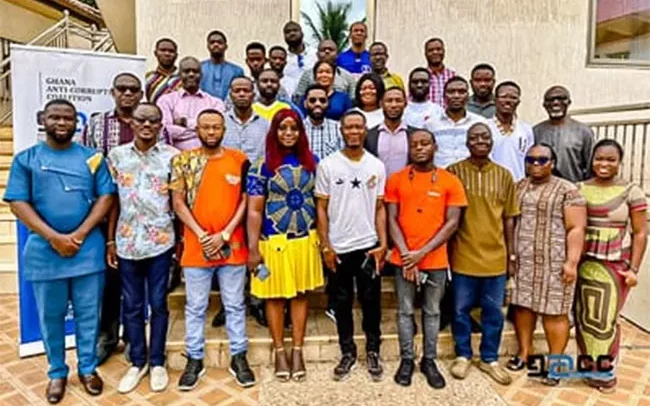A group photograph of the facilitators and the participants
The Ghana Anti-Corruption Coalition (GACC), in partnership with the Ghana Audit Service, has organised a two-day workshop in Kumasi to build the capacity of journalists on interpreting and reporting the 2024 Auditor-General’s Report.
Held from August 21 to 22, 2025, at the True Vine Hotel, the training brought together journalists from the Ashanti, Bono, Bono East, Ahafo, and Western North Regions.
It forms part of a nationwide initiative to strengthen media oversight of public financial management under the project “Building Evidence for Increased Accountability in Ghana through a Multistakeholder Accountability Initiative”, supported by the Hewlett Foundation.
The Assistant Director of Audit and Information Officer at the Audit Service, Fredrick Lokko, explained that the exercise was necessary because media reportage of audit findings often leaves the public with the wrong impression.
“When you see terms like cash irregularities, it does not always imply embezzlement or theft. Sometimes, it simply means an institution has acted outside budgetary rules. Unfortunately, the way these issues are reported makes Ghanaians believe all the quoted sums are stolen,” he noted.
He added that the Auditor-General and the management of the Service were committed to bridging the communication gap with the media to ensure fairness to institutions cited in the reports and to promote a deeper understanding of audit terminologies.
Participants were also taken through sessions on investigative skills and discussed how to turn audit data into compelling journalism and use the Auditor-General’s Report as a tool for demanding accountability.
For her part, Ms. Pamela Laourou, Assistant Communications Officer at GACC, stressed that effective media coverage of the reports could help drive reforms in public institutions.
“By sharpening the skills of journalists, the media becomes an even stronger watchdog to expose weaknesses in the system and push for good governance,” she stated.
The training, which is being rolled out in three zones, has so far benefited 90 journalists across all 16 regions.
FROM David Afum, Kumasi


